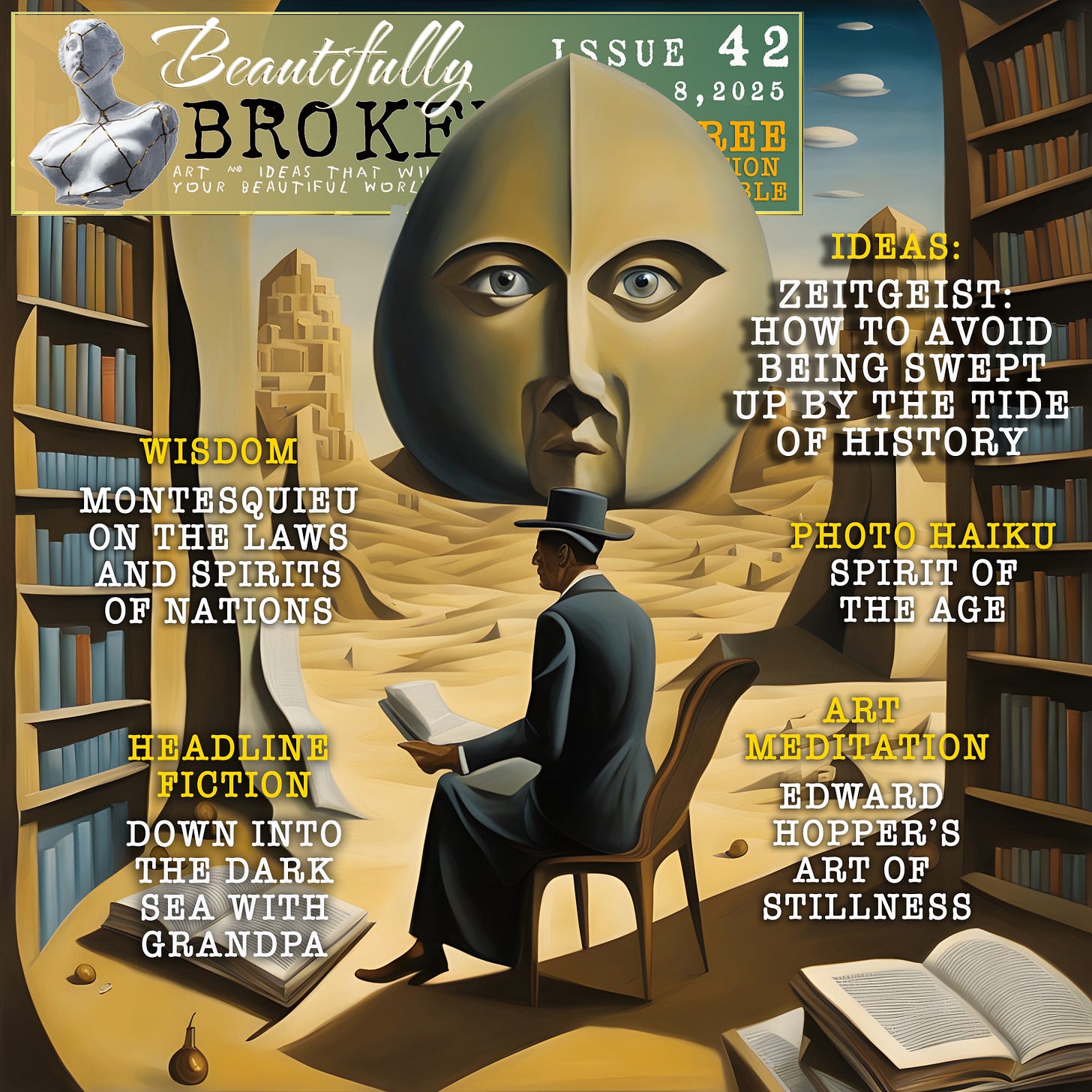Beautifully Broken Issue #42: Zeitgeist - How To Survive Being Swept Up By The Tide Of History
IDEAS, ART & WISDOM TO REPAIR OUR BEAUTIFUL WORLD
Welcome to Beautifully Broken Issue #42: Zeitgeist - How To Survive Being Swept Up By The Tide Of History
IDEAS: Zeitgeist - How To Survive Being Swept Up By The Tide Of History
“I’m not strong enough to outrun the tide of history,” a friend said to me this week. I agreed with him. When it’s about to crash, no one can outrun the tide of history unless we are, by fate or chance, someone who has the power to divert its course: a powerful politician, a cultural or religious leader or, in the rarest of cases, an unknown outlier who has changed history by self-sacrifice for the greater good (generally, the only way humans are willing to listen to someone talking sense who is not obviously powerful, wealthy or revered is for them to sacrifice their lives to demonstrate their sincerity). So, the majority of people, who wish to preserve their lives, can't change the course of global events when they take a turn for the worse. They can however implement strategies to survive them. This begins with understanding the concept of the Zeitgeist. What is this powerful tide of change that is beyond our control?
In 18th- and 19th-century German philosophy, a Zeitgeist (German lit. 'spirit of the age'; capitalized in German) is an invisible agent, force, or daemon dominating the characteristics of a given epoch in world history. The term is usually associated with Georg W. F. Hegel, contrasting with Hegel's use of Volksgeist "national spirit" and Weltgeist "world-spirit".
Its coinage and popularization precede Hegel, and are mostly due to Herder and Goethe.
Okay, so now we have an encyclopedia definition but let's look at what this means for us on a personal level and how the same tide that runs below the surface of our own lives also runs deep in our collective culture.
In life, how many times have we ourselves been the victim of our own subconscious forces? We are overtaken by some hidden force within ourselves to engage in acts that we or those closest to us would not approve of in the light of day: a crime, a self-indulgence, sex with someone we consciously know is not going to treat us well, repetitive behavior and habits that we just can't seem to break despite our best efforts with will power. If you can’t think of a single instance then think again because not only are the actions we feel are out of our control driven by these deep forces, but most of our day to day actions arise from the same source. Far fewer choices than we’d like to admit are consciously generated. We have feelings and impulses, we act and then those impulses are rationalized after the fact so that we can convince ourselves that we are in control of our lives. Still not you? Try sitting still for 20 minutes and calming the mind. If nothing arises and you feel perfectly content and connected then congratulations, you’re enlightened, in the micro percentage of human beings who are fully integrated. If not, welcome to the club, we’re all in it together, riding the chaos dragon of our hearts and minds.
Now imagine that same force amplified so that instead of just influencing you personally, it affects the entire collective tribe. That tribe can be your family, your neighborhood, an entire nation, or even the whole world. Suddenly ideas you may not have given much thought to before sweep you up. You're filled with energy and when you look around other people are experiencing the same energized drive to action. This is the mentality of the herd. It is the same impulse that causes cattle or horses to stampede. Surprise, we are animals too and respond as such to perceived threats or impulses of collective interest. Logic plays no part in this process. As in the above personal example, we are swept up and rationalize later. The herd impulse can arise when the collective feels it is under attack and must defend itself. Or it can arise when the collective is tricked into thinking it is under attack and must defend itself. Because the force is unconscious, arising from somewhere other than our conscious mind, there doesn’t have to be a real, genuine, logical cause for this energy to activate and once it activates it's like Pandora's Box: once opened, hard to close again. It is this collective unconscious force that shapes the spirit of the age (Zeitgeist). The outcomes can range from a mass cultural movement that marks an age (think the post-war 60s hippies counter culture movement) to global war and countless atrocities and suffering. A collective victory at a sporting event feels wonderful because the collective ritual act is meant to expunge excess aggressive energy and so serves to energize and sustain the culture but when the enemy is real, the suffering is real, the shadow of the other will return to enact revenge in an endless cycle of unconscious conflict and suffering. This time we’re the winners, next time, maybe not.
Keep reading with a 7-day free trial
Subscribe to Beautifully Broken to keep reading this post and get 7 days of free access to the full post archives.




